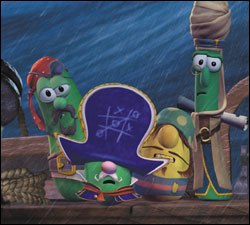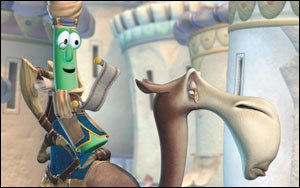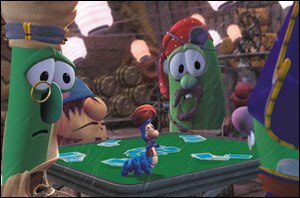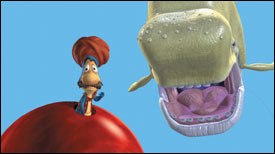Phil Vischer, founder of Big Idea Productions, explains how he turned a bunch of God loving vegetables into one of the hottest commodities around. Let's face itthese legumes are cute! Really cute! Rick DeMott reports.

Who knew 20 years ago that vegetables could be movie stars? Big Idea Production's Jonah A Veggie Tales Movie marks the best selling home video's transition to the silver screen. All images Property of Artisan Entertainment.
Let's say twenty years ago, I went into a big pitch meeting at a major studio and told them I wanted to make a series of films starring talking vegetables that believe in God. After I was done, I'm sure they wouldn't have even validated my parking pass. So how did Big Idea Productions founder, CEO and CCO Phil Vischer sell over 25 million copies of Veggie Tales videos and get a multiple feature deal with Artisan Entertainment, with talking vegetables that believe in God?
I sat down with Vischer to discuss the quick rise of his company, and even over the phone, I gained a strong sense of his passion and love for what he does. At times when he was describing characters he'd naturally go into their voices. He's very humble about his success, saying, "Too many people get into film to either be hip or make money or become famous. I never wanted any of thatI just want to tell stories." By the end of speaking with him, I discovered how an artist with a clear vision who takes advantage of an untapped public demand can start a new animation corporation out of his spare bedroom.
Humble Beginnings
In 1986, at the age of 19, Vischer got a job at a post-production house in Chicago. As the most artistically inclined person at the company, he was chosen to take a two-week Bosh animation class in Salt Lake City. He worked on commercials with the Bosh system until the studio bought a copy of Softimage in 1989. In the early 1990s, Vischer took notice to what special effects powerhouse Rhythm & Hues was creating in 3D with their proprietary squash and stretch plug-ins. A few years later Softimage announced that in their next update they would include lattice deformation, which would allow animators the ability to create squash and stretch type action.

During the company's hungry years, Big Idea founder, CEO and COO Phil Vischer declined distribution offers from companies that requested all religious references be deleted.
Vischer was now convinced that he could create fun Warner Bros.-type animation in 3D with little effort. For years, he had the idea of creating a quality family film that expressed his Judeo-Christian beliefs, however, he didn't want a lack of quality to diminish the message. With the new version of Softimage, he started experimenting with a simple character with no arms and legs and figuring out how it would bounce and move. He knew that with no limps the main source of the character's acting would come from the eyes. He used the squash and stretch technique to create eyes that brought the character to life. However, Vischer's wife, Lisa, had only one complaint with Phil's first character -- it was a candy bar. She said that if he got kids to fall in love with a candy bar character, parents would hate him. So, Vischer decided to change his character to something that was good for kids and that's how the Veggie Tales came to life.
Vischer quit his job and teamed with partner Mike Nawrocki, who came up with the name Veggie Tales, to start working on a 10-second film starring Larry the Cucumber. It was the first time that Vischer had done any lip-synch work and Nawrocki had no animation experience at all. In 1991, they shopped the idea around to various Christian video companies, but got relatively the same answer -- "If you make it, we'll sell it." Disheartened, Vischer ended up having to return to the post-house job, so that his family could survive.

When Softimage released an updated version of its animation software in the mid-'90s, Phil Vischer used it to create novel, vegetable-based characters.
However, a couple at Vischer's church thought the idea was too good to put on the shelf. They decided to put up a large chunk of their retirement fund to help pay for the film. Along with family and friends, Vischer scrounged up US$100,000 to make his first video. In July of 1993, Vischer quit his job again and purchased a Silicon Graphics animation system with Softimage and went to work on his mini-opus in the spare bedroom of his house.
After the little help he received from the Christian video companies, Vischer decided to distribute the film himself through direct-mailing ads in Christian magazines, promising a Christmas 1993 delivery of the video "Where's God When I'm S-S-Scared?" In an obvious cost cutting measure, Vischer recruited family and friends to provide the voices of the characters, who still remain the voices today. However, after completing the first 2 minutes of the film, Vischer knew that at his rate of 12-seconds per day he was never going to finish the film on time. So, he hired two college students for very little money to help out on the film. In addition, he rented a 1,600-square-foot store front between a Spanish grocer and a comic book shop to set up a studio. Vischer and the two students worked a triple shift because they only had one computer. The company's 1-800 phone number went directly into the animation room and the animators often had to take orders down as they were working. In only 4 months, the film was finished and the fledgling Big Idea Productions shipped 500 copies of their first video three days before Christmas.
What's This?
It didn't take long for the Christian video companies who balked on funding the Veggie Tales to notice that Big Idea had created something special. Word Entertainment, one of the largest and most respected Christian entertainment corporations, flew Phil and Lisa to Nashville and wined and dined them. And as Phil commented, this was really nice after nearly starving for the last few months! Subsequently, Word signed a 13 video Christian store distribution deal with Big Idea and the phenomenon was on its way.
In a genius stroke of business savvy, Vischer retained the general distribution rights to the property, knowing that Christian companies had bad track records with general distribution and general distribution companies have trouble with Christian market distribution. Vischer said by the summer of 1994, they were getting "nibbles from major distribution companies." They met with several companies, but they wanted Vischer to take out all references to God and the Bible verse at the end. He declined. By the next year, the first two Veggie Tales tapes had sold 200,000 units. Now, the major distribution companies just wanted Vischer to take out the Bible verse. After some soul searching, Vischer decided not to "sell out." He said, "I wanted to keep true to what the fans of Veggie Tales expected."

The feature film's distributor, Artisan Family Home Entertainment, didn't blink an eye when Big Idea insisted on retaining ownership of the movie and its characters and keeping total creative control.
Then by late 1997, Veggie Tales tapes had sold over 2 million units and the popularity was growing. Lyric Studios, who own Barney, had no problem with the Bible verse and signed a deal to release the tapes in the mass market. Before the deal was officially signed, word got out that Lyric was obtaining the rights to Veggie Tales and stores started calling in for orders. The projection was that the videos would sell about 300,000 copies in the mass market -- they went on to sell 1.5 million!
In 1999, Vischer came up with the idea for making a Veggie Tales feature based on the Biblical tale of Jonah and the whale. He knew he could keep the production costs down and felt that if he marketed the film in Christian magazines and bookstores, on the radio and with trailers on other Veggie Tales videos that his core audience would come in droves. Already in 47 states, bookstores were sponsoring theater premieres of the new videos. One Baptist church in Orlando had 16,000 people attend one of their theater screenings. Imagine, sixteen thousand people came to see a VHS version of a 30-minute direct-to-video projected on a screen.
After production started on the feature, Big Idea talked to most of the major and mini-major distribution companies about releasing the film. Vischer had no allusions that the film would make $100 million at the box office, which is the target for every theatrically-released animated movie. Vischer explains, "The major studios don't even know how to launch a film without spending at least $20 million on P&A (press and advertising)." Continuing, Vischer says, "The more you spend on P&A, the more the film has to makeright now, if Jonah makes $25 million then we'll about break even." For other 3D studio pictures, that gross would be a profound failure.

A combination of production savvy and marketing through Christian magazines, bookstores and media outlets kept the overall budget low. Here, Khalil meets the whale in Jonah A Veggie Tales Movie.
Another wrinkle that frightened some distribution houses away was Big Idea's stipulation that they would retain ownership of the movie and the characters as well as have total creative control. Artisan had no hesitation with the terms and signed on to release the film. Up until 5 years ago, Artisan was solely a video distribution house, releasing Hallmark and Crayola productions and the direct-to-video 3D animated feature, Barbie in the Nutcracker. Their understanding of the video market only made Big Idea's phenomenal success more impressive. Glenn Ross, president of Artisan Family Home Entertainment, says, "We had tremendous respect for the seriesand it's very rare to find a production where the audience is so clear."
Artisan had so much faith that Vischer reveals, "The whole deal was worked out without even showing them a script."
When asked about dealing with Big Idea's terms, Ross says, "With over 25 million tapes sold, you can't argue with success. What makes me think that I could do it any better?"
A Number of Surprises
Jonah, The Veggie Tales Movie boasts the distinction of being the first animated feature to be completely done in Maya even using the Maya rendering system. The first Veggie Tales video was made by three people on a miniscule budget, now Big Idea had over 95 animators (which is still small for an animated feature) working on a multi-million dollar budgeted film. I guess you can't argue with success.
An interesting fact about the film, which hits screens on October 4, 2002, is its central theme of mercy and compassion. With the script and songs completed back in '99, the poignancy of the message is very prophetic. Vischer explains, "We're too obsessed with vengeance. Look at all the Lethal Weapon films. The beginning makes us hate the bad guys and the rest of the film is about making them pay. We always make ourselves the good guys. We can't admit to being bad guys even though we are all bad guys in some way." After you see the film you'll understand why maybe there should be a special screening at the U.N.
Veggie Tales just gets more popular day by day and with 80% of the U.S. saying they believe in some Judeo-Christian religion the audience is huge. Did Vischer ever think back in the spare bedroom that his little creation would have gotten as big as it has? "I really, really hoped. I knew if I could translate the stories in my head to the screen they'd work. I'm just so surprised at how quickly it all came about."
I told Vischer about seeing 10,000 teenagers go crazy when Larry the Cucumber and Bob the Tomato came up on the jumbo-tron at a Christian rock festival. I also told him that my sister's friend's little girl's first word was "Bob." I could feel his smile on the other end of the phone when he said, "That is the pay-off." I told him stories of skeptical parents not wanting their kids to watch Veggie Tales because of the religious messages, but when they saw it they loved it. His response was, "That's amazingly cool." But I could hear in his voice that he's heard that same kind of story lots of times.
He told me stories that were even more amazing. He said he'd heard that Larry t-shirts had showed up in rave clubs in Chicago. Teenagers in a trendy night-club wearing clothing with God-fearing vegetables on the front? Davey and Goliath could only wish for that. Another story he told me was about a very big studio exec, who told him that he and his wife had a tough time deciding on what to let their kids watch. His mother was Jewish and his father was Presbyterian and his wife is Catholic. He told Vischer that Veggie Tales was the only thing they could agree on.

Vischer's challenge is to present Biblically themed stories in a way that will appeal to children. He strives to make "apples taste like Twinkies."
I went on to ask Vischer why he thinks Big Idea is such a success and he had a lot to say about it. He believes the main strength of the company is their philosophy that people come first, products second and profits third. As stated on the company Website, "Profiting is like breathing. As humans, we must breathe to live, but we do not live to breathe. As a company, Big Idea must profit to exist, but we will not exist merely to profit."
With Vischer it's all about balance. He believes that the Biblically themed stories have to be presented in a cool way to attract an audience. While he contends too many comedies take nothing seriously and paint life as a joke, he realizes earnestness is often taken as corny. Therefore, he tries to balance tongue and cheek humor with sincerity. He describes it like making "apples that taste like Twinkies. It tastes great and it's good for you."
Big Idea's mission statement says they want to become one of the top family entertainment brand names in the world. And Vischer describes his vision of Big Idea how Walt Disney and Jim Henson envisioned their companies when they started -- a family owned and run business that is focused on creating quality family entertainment.
The company is still selling videos like crazy and wants to branch out into television. The merchandising arm of the firm keeps growing and new titles like the superhero show Larryboy (produced in Flash by Cornerstone Animation) and the action-adventure show 3, 2, 1 Penguins offer distribution companies and the public more varied entertainment. Even though profits are their third priority, if Jonah garners the dedicated following that other recent Christian-themed films like The Omega Code and Left Behind have, and with the already proven Veggie Tales draw, Big Idea might bring in money, for which other companies could only pray.
Rick DeMott currently works for sound production house BadaBing BadaBoom Productions and animation company Perky Pickle Studios. In his free time, he works as a freelance writer and a regular contributor to the humor website, PorkPony.com.







